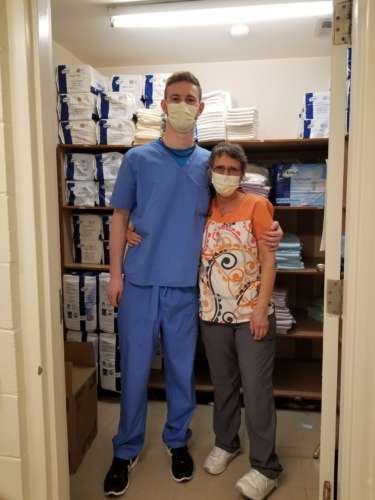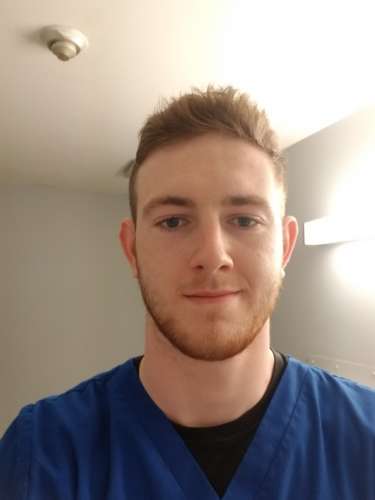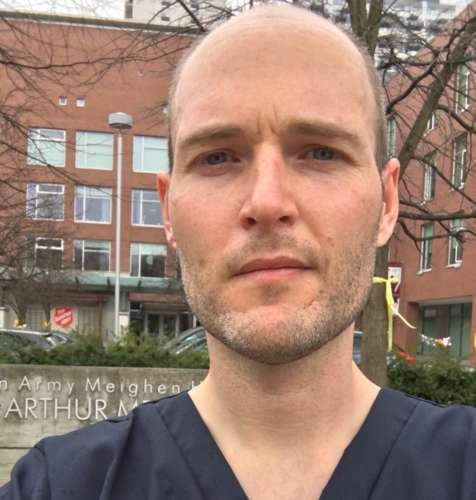
During the early stages of the COVID-19 prevention measures, amid completing classes and preparing for final exams, University of Guelph student Erik Campbell-Anton felt compelled to serve on the front lines of the pandemic.
He took a job at Caressant Care, an assisted living home in St. Thomas, Ont., working alongside his grandmother and two aunts who are staff members there. He wanted to make their lives and the lives of the residents a little bit easier.
“We are going through an extremely difficult time as a society, with COVID-19 taking a toll on everyone, whether it be physical or mental,” said Campbell-Anton, a history major at U of G. “I felt rather useless sitting at home doing nothing.”
He saw the job as an opportunity to assist front-line workers by alleviating some of the stress they are under due to staff shortages and heightened safety measures.
“One thing that has become apparent to me,” he said. “Being able to bring joy to the residents is indescribable, whether it takes the form of a joke, an innocent flirt or a funny look, when warranted.”
The work has brought a newfound happiness to his life.
“I believe a little ray of sunshine during times like these makes all the difference, especially for residents. Being able to drop in and have chit-chats throughout the day helps break the monotony of their routine.”

U of G history professor Jacqueline Murray said Campbell-Anton is an A student in her second-year Film and History course.
“I think Erik is doing something quite wonderful,” Murray said. “We have all seen the COVID-19 disaster that is hitting the area of long-term care and watched as caregivers grow overwhelmed and seniors become left without basic support.”
She likened the young man to a first responder and a hero.
“Ontario’s Premier says it is like a wildfire raging through the long-term care sector, and I think Erik is like a firefighter running into harm’s way,” she said. “He is displaying the kind of caring nature that we consider inherent in U of G students, helping in the most difficult circumstances. I hope he inspires others to follow this same path.”
The pandemic has hit Canada’s long-term care homes hard, especially in Ontario and Quebec, with most deaths happening in these facilities.
Ontario Premier Doug Ford has requested support from the Canadian military to help manage extreme situations in several care homes in Ontario, and Quebec has also requested military assistance.
Jeff Vdovjak is in his fourth year in kinesiology at the University of Guelph-Humber. Like Campbell-Anton, he was troubled by the long-term care situation and wanted to help.
In the home where he just started working, 16 people have died and more than 65 people have contracted the disease, including 16 staff members.
“We have seen Premier Ford’s request to bring the military into five long-term care homes in Ontario,” Vdovjak said. “There aren’t enough workers, not enough people stepping up. Many long-term care facilities are already short-staffed.”

He hopes more students will look to support the permanent staff who have been carrying the COVID-19 workload. He said he found helpful resources at HealthWorkerHousing.ca/ and the Greater Toronto Hotel Association that enabled him to move to Toronto and find affordable housing.
Vdovjak is used to serving in emergency situations. He has travelled abroad to help in humanitarian efforts and most recently spent six months in Haiti.
“Canada is in need and I am happy I can help,” he said. “Our seniors are vulnerable, and they are disproportionately affected by COVID-19. In past generations, Canadians had to fight wars. I’d like to be of help now in this crisis.”
CTV Kitchener recently featured Campbell-Anton and Vdovjak.
Being a resident support assistant comes with a variety of responsibilities, Campbell-Anton said, from basic cleaning and making beds to ensuring safety measures are being followed.
“My position allows some free time, which I often spend conversing with the residents, playing games or setting up activities and ensuring they are occupied during this difficult time, when the individual wings of the building are quarantined due to COVID-19 risk.”
He said his mornings are filled with big smiles. He delivers a loud “Good morning, ladies and gentlemen” as he makes his rounds and offers his services. He also assists health-care aids and personal support workers as needed, whether it’s answering call bells or running dish and food carts back to the kitchen.
“You could say I am a resident-staff assistant who is also there to maintain high spirits within the home,” he said.
Campbell-Anton said he wanted to make a difference and serve others, not sit around at home. When he learned of the vulnerability of nursing home residents, he decided to act.
“The benefits definitely outweigh the potential danger of assuming a new job during this time.”
As a history student, he is getting many lessons while on the job. Most of the residents have lived long lives and love to talk about their experiences. Many are immigrants, with stories to tell about the Second World War, the Hungarian Revolution and the Korean and Vietnam wars.
“These conversations are priceless and offer a degree of realism and humanity that no textbook could ever achieve. The way they speak and the emotion in their voices tells a story all on its own.”